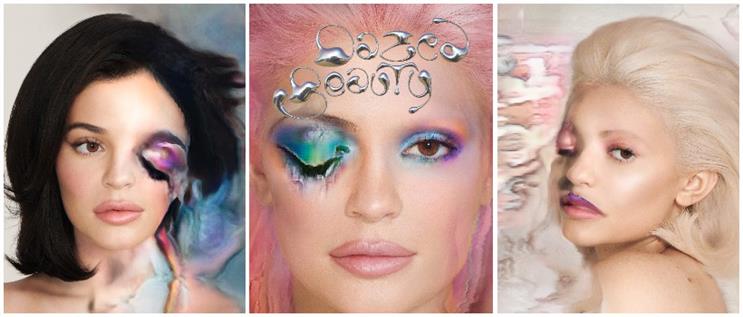When earlier this year, critics dubbed it "the most 2019 beauty editorial ever".
Dazed Beauty used Beauty_GAN, an artificial-intelligence algorithm created by design studios Selam X in Berlin and Art404 in New York, to "create beauty looks without the help of a human". The resulting images, which were shot by Daniel Sannwald, are reflective of the breaking down of barriers between the physical and the digital.
Bunney Kinney, editor-in-chief of Dazed Beauty and editorial director of Nowness, describes the resulting images as "strangely beautiful and compelling".
A new reality
According to Kinney, this fusion of real and virtual is creating its own kind of reality: "The proliferation of AI and filters is trickling down to anyone with a smartphone and that speaks to a base interest a lot of people have bought into – the idea of transformation."
Kinney is at the forefront of this transformation, having previously worked at i-D, where as commercial creative director he led projects with brands including Gucci, Marc Jacobs, Burberry, Loewe and Chanel. He has also worked as a digital consultant for brands including Dior, Mac, L’Oréal Luxe and Universal Music.
"What we are seeing is the novelty of transformation, but we will continue to see that evolve into more profound changes," Kinney explains. "People want to transform themselves, manipulate themselves and digital platforms give them more choice."
Kinney believes that young people in particular have a genuine desire to subvert physical norms. As he explains: "On a digital level, we see this idea of trying to change yourself in many ways. It will be interesting to see how that evolves. People will change how they look on the outside to match how they feel on the inside."
On a practical level, this trend is manifesting itself in everything from fragrances to match their mood to extreme make-up transformations.
"The question is: will the opportunity afforded by the virtual surpass the experience of the body? Will we see more body modification to enable people to look like their avatar?" Kinney asks. It is a shift that is already happening with the proliferation of hyper-pigmented make-up products, many of which are essentially bringing Facebook and Instgram filters to life in the real world.
Life on broadcast
For Kinney, the evolution of influencer culture and influence marketing demands a step change in thinking about what constitutes influence in the first place.
"The term 'influencer' might induce eye rolls among some publishers, but it extends to celebrity, supermodels and hyper-local communities," Kinney says. "It isn’t so much about traditional models of celebrity as it is about people living in the middle of nowhere but having a voice."
He notes that while mainstream media coverage of influencer culture has perhaps focused on the carefully curated Instagram feed, it is "when we see the seams revealed" that influencers can connect on an authentic level.
"Young people are very cynical and it's interesting to see how they respond to partnering with brands," Kinney adds. "A greater level of transparency will be essential and a lot of time [influencer marketing] has been very lazy." He believes brands need to be asking more questions about their influencer strategy – not just how many followers they have and how that trickles down to authentic connections.
In the midst of an influencer backlash – a recent example of which involves a Listerine influencer campaign that went viral for all the wrong reasons – Kinney predits that influencer marketing will continue to have "backlash moments".
"It is a highly politicised environment, it is a democratic enviroment and, yes, there can be vitriolic moments," he says. "But also there can be viral moments, celebratory moments – convesations that become a dialogue for debate and change."
Inclusive futures
A growing tranche of influencers are using their power to challenge traditional beauty ideals and gender stereotypes, and to advocate for a fairer, more inclusive world.
"It is no longer a top-down model of influence, where a bunch of white men decide what will be bought regardless of what the cost is," Kinney explains. "It is a truly diverse market and the ultimate destination for your prodicts is a diverse audience."
Kinney believes that the hegemony of the Western world has contributed to the hidden biases we operate behind. However, he points to the impact of Fenty, the inclusive beauty brand, as evidence of the fundamental shift. While many beauty brands will say they are inclusive, Fenty placed it at the heart of its brand DNA. The phenomenal commercial success of it has meant "the Fenty effect" is still making waves across the industry.
"There is a human desire for representation, to understand you have been considered," Kinney adds. In the influencer age, consumers are becoming more aware of the hidden structures, biases and misrepresentation in media and advertising.
It is a consumer awakening that Kinney sees playing out on a community and editorial level: "There has been a huge shift. Beauty is no longer about fixing yourself or correcting flaws."
Pointing to the way in which influencers and consumers have embraced the power of expressing themselves via transformation through make-up, he believes that message has now "trickled up" to brands.
Historically, the beauty industry has in effect been selling women "hope in a jar" for generations. There is a long history of brands marketing products on the basis of correcting percieved or imagined flaws. A beauty industry that's, in short, built on fear.
Yet the age of influence has turned this model on its head. As Kinney explains: "Beauty today is about creativity, self-expression and loving yourself. It doesn't need to come from an insecure place. Be whoever you want to be. You can be a digital avatar or you can paint your face as a clown; it is all about finding your truth."
It's a truth that doesn’t always require a filter or a filler.



